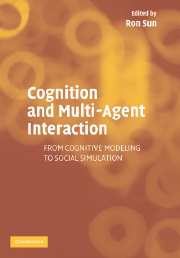Book contents
- Frontmatter
- Contents
- List of Contributors
- Preface
- PART 1 INTRODUCTION
- PART 2 OVERVIEWS OF COGNITIVE ARCHITECTURES
- PART 3 MODELING AND SIMULATING COGNITIVE AND SOCIAL PROCESSES
- 5 Cognitive Architectures, Game Playing, And Human Evolution
- 6 Simulating A Simple Case Of Organizational Decision Making
- 7 Cognitive Modeling of Social Behaviors
- 8 Cognitive Agents Interacting in Real and Virtual Worlds
- 9 Modeling Social Emotions and Social Attributions
- 10 Communicating and Collaborating with Robotic Agents
- 11 Behavior-Based Methods for Modeling and Structuring Control of Social Robots
- 12 Evolution of a Teamwork Model
- 13 Sociality in Embodied Neural Agents
- 14 Cognitive Architecture and Contents for Social Structures and Interactions
- PART 4 A SYMPOSIUM
- Index
5 - Cognitive Architectures, Game Playing, And Human Evolution
Published online by Cambridge University Press: 15 December 2009
- Frontmatter
- Contents
- List of Contributors
- Preface
- PART 1 INTRODUCTION
- PART 2 OVERVIEWS OF COGNITIVE ARCHITECTURES
- PART 3 MODELING AND SIMULATING COGNITIVE AND SOCIAL PROCESSES
- 5 Cognitive Architectures, Game Playing, And Human Evolution
- 6 Simulating A Simple Case Of Organizational Decision Making
- 7 Cognitive Modeling of Social Behaviors
- 8 Cognitive Agents Interacting in Real and Virtual Worlds
- 9 Modeling Social Emotions and Social Attributions
- 10 Communicating and Collaborating with Robotic Agents
- 11 Behavior-Based Methods for Modeling and Structuring Control of Social Robots
- 12 Evolution of a Teamwork Model
- 13 Sociality in Embodied Neural Agents
- 14 Cognitive Architecture and Contents for Social Structures and Interactions
- PART 4 A SYMPOSIUM
- Index
Summary
INTRODUCTION
Game playing is an excellent domain for researching interactive behaviors because any time the outcomes of the interactions between people are associated with payoffs the situation can be cast as a game. Because it is usually possible to use game theory (von Neumann & Morgenstern, 1944) to calculate the optimal strategy, game theory has often been used as a framework for understanding game-playing behavior in terms of optimal and sub-optimal playing. That is, players who do not play according to the optimal game theory strategy are understood in terms of how they deviate from it. In this chapter we explore whether or not this is the right approach for understanding human game-playing behavior, and present a different perspective, based on cognitive modeling.
Optimal game theory models have been shown to be predictive of competitive strategies used by some animals (see Pool, 1995 for a review), leading to the argument that the process of evolution acts as a genetic algorithm for producing optimal or near-optimal competitive behaviors. However, game theory models have not been very successful in predicting human behavior (Pool, 1995). In fact, psychological testing indicates that, from a game theory perspective, humans do not have the necessary cognitive skills to be good players.
- Type
- Chapter
- Information
- Cognition and Multi-Agent InteractionFrom Cognitive Modeling to Social Simulation, pp. 103 - 123Publisher: Cambridge University PressPrint publication year: 2005
- 4
- Cited by



